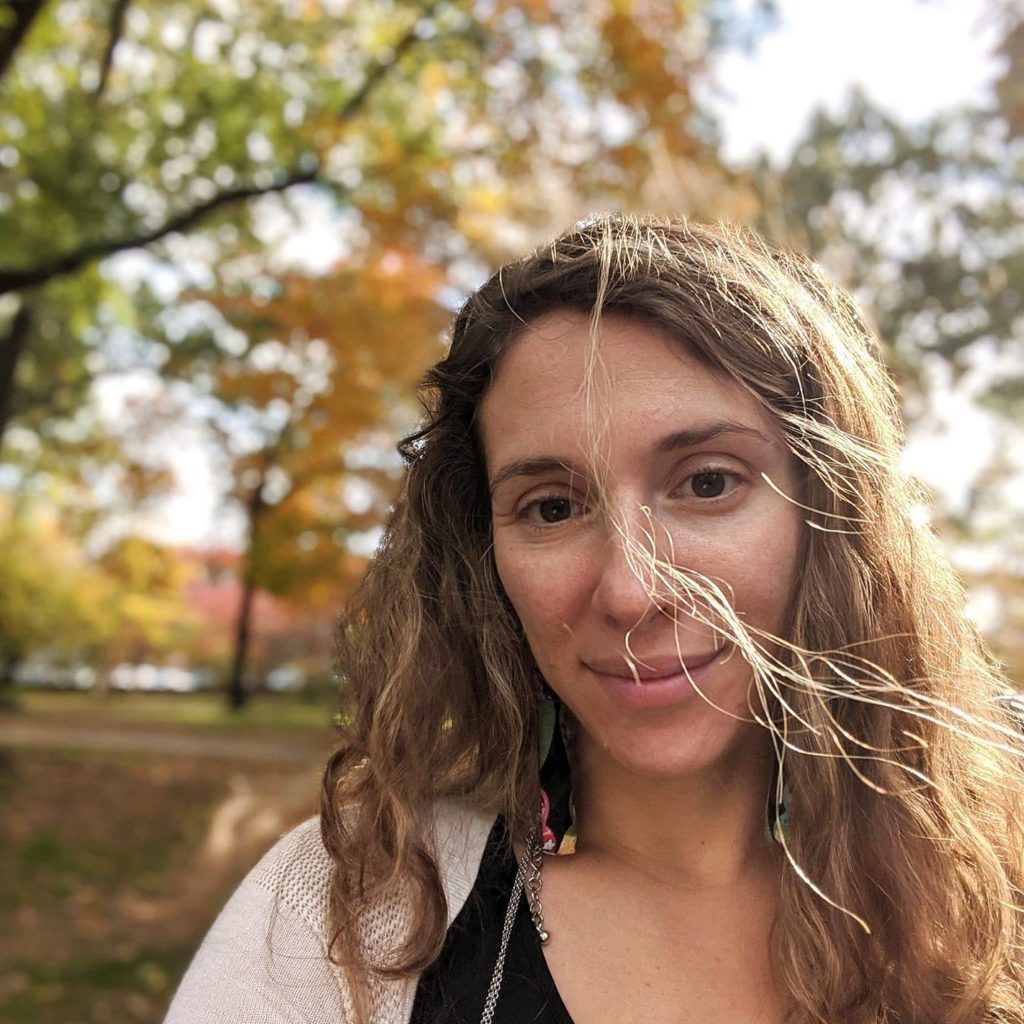
Take an X-ray of the sun, you’ll find
.
a Rainier cherry
at its yellow heart, fire
skinned and ripe
with reaching.
But in the sunless
lush green mosses
where the fruit
is born, bucketfuls
of sweetness
only bring to mind
vareniki s vishnami,
cherry dumplings,
made on a board
over the bathtub
we called a kitchen table.
I watched my mama work
flour deep into the dough,
her nails a darker red than
chernacorka, black-rind,
sour cherries,
that only grow
out of Ukrainian soil
and taste, or tasted once,
like the inside
of sunlight, or
its saccharine glow
fighting to get out.
.
(Previously Published in The Many Names for Mother, Kent State University Press, 2019)
.
.
Dear Birthplace,
In 1993, the USSR had already collapsed, I was already six-years old, and you were already a sovereign nation. Only then, after years trying to flee, my family was granted Jewish-refugee status and allowed to leave you, Ukraine, never to return or regret leaving.
I remember little of your then mostly Russian speaking Dnipro. My Rodina, birth-city, homeland I never knew as home. I recall the sausage and Kvass street-vendors we couldn’t afford; the rusting fountains I walked when the river flooded; the hours in line, waiting for bread and eggs and milk and tomorrow; and the neighborhood boys, who once threw stones at me because I was a little zhid girl playing on their street. And this, I thought, this was trauma. And our final departure, that rain-drenched winter, a break from the language and world I was just learning to read, this was trauma too.
But today, when my American soil is covered by heavy-white, Soviet-like January snows, while Kyiv’s streets are melting, rutted with fire and ash-tarred bodies, I know that I know nothing of your trauma.
When the police are shooting and beating and tearing into your own people on their own streets—brother’s body against a brother’s against their mother—I can’t begin to know your unearthed demons, the death sinking into your once envied chernozyom with the hope of leaving roots.
Can’t begin to understand what violence mutilates your body: a starving tree grown wild and violent: a cracking flesh that I believed was once my country.
And I close my eyes, try to think harder, to remember or imagine it, that ghost elusiveness of you. But I recall only the train ride to your capitol city, and the hardboiled eggs we pealed while playing cards on the top bunk. Too young to understand them then, the games, the very gamble we were taking.
We won. I know that only now. But I have lost the way to place the place of you, of motherland, inside my mind. I want to remember Kyiv’s central square, Maidan, standing there before its fountains or seeing it shrink below through the window of an airplane, but nothing comes, and so I watch a recent video of a journalist hit with a grenade amidst the burning barricade and faceless military men. And that square, that you, is somewhere in the background, lost in all the smoke and panic: first aflame and then a grave.
I read the news, watch footage of “medieval violence,” as one reporter called it, but feel only pressure. An iron lung, the weight of memory or its lack. The fear of losing people and a country.
Not mine, its someone else’s wound,
Anna Akhmatova whispers.
And in writing myself into your story, I know I am at fault—an artful imbedding, a weed trying to thrive in an estranged history.
So instead, I’ll go back to Caruth and Freud, and all their distant trauma theory. I’ll watch their pages thin to legible skin, but turn meaningless in the face of what is real and indescribable. In the face of “the trauma” I thought I knew, the one I know I cannot touch. The too soon forgotten foreign bodies bleeding in your own Slavonic name. A country shattering like a red-gold teacup.
I try to carry it, this story. Try to write it across the Atlantic. But it is yours, and yours alone. I have no right to it. Mourning must be earned.
Forgive me, Rodina—ground where I was born. Forgive me, rodnaya—my dear, my native familial flesh. And I’ll forgive that you are not a motherland who grants forgiveness.
.
(Previously Published in Grist)
.
BIO: Julia Kolchinsky Dasbach (www.juliakolchinsky.com) emigrated from Dnipro, Ukraine as a Jewish refugee in 1993, when she was six years old. She is the author of three poetry collections: The Many Names for Mother, winner the Wick Poetry Prize (Kent State University Press, 2019), finalist for the Jewish Book Award; Don’t Touch the Bones (Lost Horse Press, 2020), winner of the 2019 Idaho Poetry Prize; and 40 WEEKS, forthcoming from YesYes Books in February, 2023. Her poems appear in POETRY, Ploughshares, American Poetry Review, and AGNI, among others. She holds an MFA from the University of Oregon and a Ph.D. in Comparative Literature and Literary Theory from the University of Pennsylvania. Her dissertation, Lyric Witness: Intergenerational (Re)collection of the Holocaust in Contemporary American Poetry, pays particular attention to the underrepresented atrocity in the former Soviet territories. Julia is the author of the model poem for “Dear Ukraine”: A Global Community Poem https://dearukrainepoem.com/. She is the Murphy Visiting Fellow in Poetry at Hendrix College and lives in Little Rock, Arkansas with her two kids, cat, dog, and husband.

